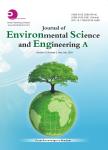Use of geospatial technology for landfill site selection
Use of geospatial technology for landfill site selection作者机构:Faculty of Engineering University Putra Malaysia Selangor 43400 Malaysia Institute of Advanced Technology Selangor 43400 Malaysia Department of Biological and Agricultural Engineering University Putra Malaysia Selangor 43400 Malaysia Department of Civil Engineering University Putra Malaysia Selangor 43400 Malaysia
出 版 物:《Journal of Environmental Science and Engineering》 (环境科学与工程(英文版))
年 卷 期:2009年第3卷第9期
页 面:28-34页
学科分类:083002[工学-环境工程] 0830[工学-环境科学与工程(可授工学、理学、农学学位)] 08[工学] 0825[工学-航空宇航科学与技术]
主 题:site selection geospatial landfill fuzzy logic solid waste management
摘 要:Growth of population and extensive industrial development had increases solid wastes and pollutants in many parts of the world. Due to the economic and technologic limitations not all waste can be easily turn to other sort of materials or energy. As a result so, we still have to rely on the common solution to bury as to excrete urban wastes. Selection of an appropriate site for this process in a big city like Mashad in Iran is an important task which needs a cautious, strategic planning and investigations at various levels. With regards to this issue it is necessary to have a comprehensive volume of spatial information of the surrounding area and a proper analysis and spatial exploration need to be done. The methodology being implemented utilized geospatial technology for the management and visualization of spatial data while fuzzy logic is used in searching the best location for site selection. In this paper the basic elements of the fuzzy logic methodology as well as its potential in the specific problem are described. A case study for Mashad city is elaborated. The results drawn up by fuzzy logic are compared with that of the traditional Boolean approach in the decision making process.



